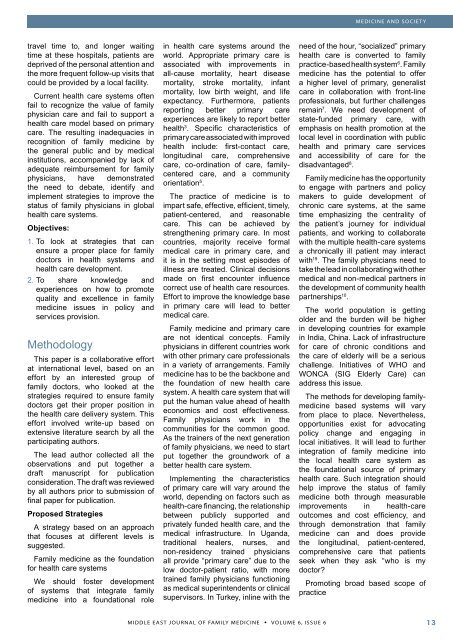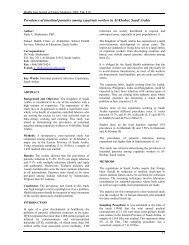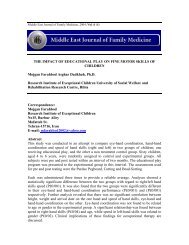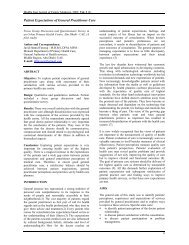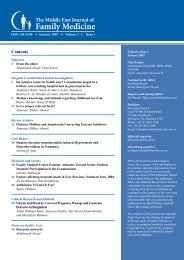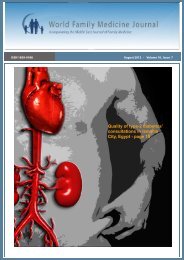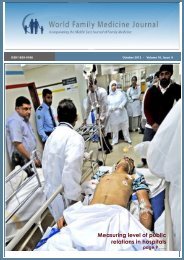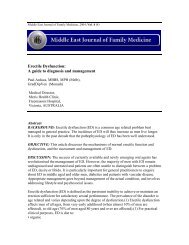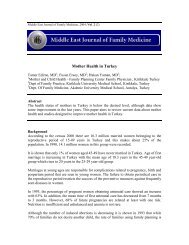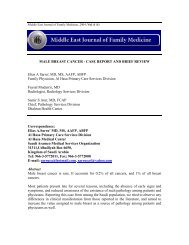full pdf of issue - Middle East Journal of Family Medicine
full pdf of issue - Middle East Journal of Family Medicine
full pdf of issue - Middle East Journal of Family Medicine
Create successful ePaper yourself
Turn your PDF publications into a flip-book with our unique Google optimized e-Paper software.
MEDICINE AND SOCIET Ytravel time to, and longer waitingtime at these hospitals, patients aredeprived <strong>of</strong> the personal attention andthe more frequent follow-up visits thatcould be provided by a local facility.Current health care systems <strong>of</strong>tenfail to recognize the value <strong>of</strong> familyphysician care and fail to support ahealth care model based on primarycare. The resulting inadequacies inrecognition <strong>of</strong> family medicine bythe general public and by medicalinstitutions, accompanied by lack <strong>of</strong>adequate reimbursement for familyphysicians, have demonstratedthe need to debate, identify andimplement strategies to improve thestatus <strong>of</strong> family physicians in globalhealth care systems.Objectives:1.2.To look at strategies that canensure a proper place for familydoctors in health systems andhealth care development.To share knowledge andexperiences on how to promotequality and excellence in familymedicine <strong>issue</strong>s in policy andservices provision.MethodologyThis paper is a collaborative effortat international level, based on aneffort by an interested group <strong>of</strong>family doctors, who looked at thestrategies required to ensure familydoctors get their proper position inthe health care delivery system. Thiseffort involved write-up based onextensive literature search by all theparticipating authors.The lead author collected all theobservations and put together adraft manuscript for publicationconsideration. The draft was reviewedby all authors prior to submission <strong>of</strong>final paper for publication.Proposed StrategiesA strategy based on an approachthat focuses at different levels issuggested.<strong>Family</strong> medicine as the foundationfor health care systemsWe should foster development<strong>of</strong> systems that integrate familymedicine into a foundational rolein health care systems around theworld. Appropriate primary care isassociated with improvements inall-cause mortality, heart diseasemortality, stroke mortality, infantmortality, low birth weight, and lifeexpectancy. Furthermore, patientsreporting better primary careexperiences are likely to report betterhealth 3 . Specific characteristics <strong>of</strong>primary care associated with improvedhealth include: first-contact care,longitudinal care, comprehensivecare, co-ordination <strong>of</strong> care, familycenteredcare, and a communityorientation 5 .The practice <strong>of</strong> medicine is toimpart safe, effective, efficient, timely,patient-centered, and reasonablecare. This can be achieved bystrengthening primary care. In mostcountries, majority receive formalmedical care in primary care, andit is in the setting most episodes <strong>of</strong>illness are treated. Clinical decisionsmade on first encounter influencecorrect use <strong>of</strong> health care resources.Effort to improve the knowledge basein primary care will lead to bettermedical care.<strong>Family</strong> medicine and primary careare not identical concepts. <strong>Family</strong>physicians in different countries workwith other primary care pr<strong>of</strong>essionalsin a variety <strong>of</strong> arrangements. <strong>Family</strong>medicine has to be the backbone andthe foundation <strong>of</strong> new health caresystem. A health care system that willput the human value ahead <strong>of</strong> healtheconomics and cost effectiveness.<strong>Family</strong> physicians work in thecommunities for the common good.As the trainers <strong>of</strong> the next generation<strong>of</strong> family physicians, we need to startput together the groundwork <strong>of</strong> abetter health care system.Implementing the characteristics<strong>of</strong> primary care will vary around theworld, depending on factors such ashealth-care financing, the relationshipbetween publicly supported andprivately funded health care, and themedical infrastructure. In Uganda,traditional healers, nurses, andnon-residency trained physiciansall provide “primary care” due to thelow doctor-patient ratio, with moretrained family physicians functioningas medical superintendents or clinicalsupervisors. In Turkey, inline with theneed <strong>of</strong> the hour, “socialized” primaryhealth care is converted to familypractice-based health system 6 . <strong>Family</strong>medicine has the potential to <strong>of</strong>fera higher level <strong>of</strong> primary, generalistcare in collaboration with front-linepr<strong>of</strong>essionals, but further challengesremain 7 . We need development <strong>of</strong>state-funded primary care, withemphasis on health promotion at thelocal level in coordination with publichealth and primary care servicesand accessibility <strong>of</strong> care for thedisadvantaged 8 .<strong>Family</strong> medicine has the opportunityto engage with partners and policymakers to guide development <strong>of</strong>chronic care systems, at the sametime emphasizing the centrality <strong>of</strong>the patient’s journey for individualpatients, and working to collaboratewith the multiple health-care systemsa chronically ill patient may interactwith 19 . The family physicians need totake the lead in collaborating with othermedical and non-medical partners inthe development <strong>of</strong> community healthpartnerships 10 .The world population is gettingolder and the burden will be higherin developing countries for examplein India, China. Lack <strong>of</strong> infrastructurefor care <strong>of</strong> chronic conditions andthe care <strong>of</strong> elderly will be a seriouschallenge. Initiatives <strong>of</strong> WHO andWONCA (SIG Elderly Care) canaddress this <strong>issue</strong>.The methods for developing familymedicinebased systems will varyfrom place to place. Nevertheless,opportunities exist for advocatingpolicy change and engaging inlocal initiatives. It will lead to furtherintegration <strong>of</strong> family medicine intothe local health care system asthe foundational source <strong>of</strong> primaryhealth care. Such integration shouldhelp improve the status <strong>of</strong> familymedicine both through measurableimprovements in health-careoutcomes and cost efficiency, andthrough demonstration that familymedicine can and does providethe longitudinal, patient-centered,comprehensive care that patientsseek when they ask “who is mydoctor?Promoting broad based scope <strong>of</strong>practiceMIDDLE EAST JOURNAL OF FAMILY MEDICINE • VOLUME 6, ISSUE 6 13


